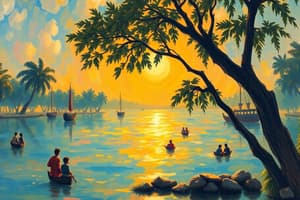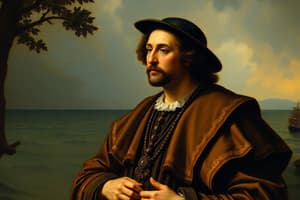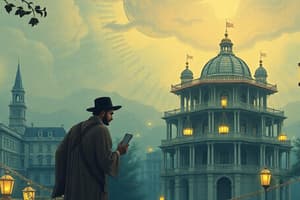Podcast
Questions and Answers
What date did Christopher Columbus arrive in America?
What date did Christopher Columbus arrive in America?
October 12, 1492
Which of the following cultures were in contact during the early American history? (Select all that apply)
Which of the following cultures were in contact during the early American history? (Select all that apply)
- West Africans (correct)
- Asians
- Native Americans (correct)
- Europeans (correct)
What were the significant kingdoms of West Africa?
What were the significant kingdoms of West Africa?
Ghana, Mali, Songhai
What were the main trade items in West Africa? (Select all that apply)
What were the main trade items in West Africa? (Select all that apply)
West African slavery was based on race.
West African slavery was based on race.
What was the main issue in early American history?
What was the main issue in early American history?
Match the European explorers with their notable achievements:
Match the European explorers with their notable achievements:
What did the Treaty of Tordesillas accomplish?
What did the Treaty of Tordesillas accomplish?
Who tried to force England back into the Catholic Church?
Who tried to force England back into the Catholic Church?
What was the Columbian Exchange?
What was the Columbian Exchange?
Who was the first English explorer to attempt colonization in America?
Who was the first English explorer to attempt colonization in America?
What major religious movement challenged Spain during the period of 1560 in Europe? (Select all that apply)
What major religious movement challenged Spain during the period of 1560 in Europe? (Select all that apply)
Flashcards are hidden until you start studying
Study Notes
Christopher Columbus and 1492
- Columbus landed in the Bahamas on October 12, 1492, believing he had reached India after a three-month voyage.
Cultures in Contact
- Three main cultures interacted: Native Americans, West Africans, and Europeans.
Native Americans
- Diverse societies with established civilizations.
- Population estimates ranged from 8 to 100 million in 1492, dramatically declining afterward.
West African Kingdoms
- Major kingdoms included Ghana, Mali, and Songhai.
West African Trade
- Key commodities included gold, salt, and ivory.
West African Slave History
- Slavery in West Africa was not race-based and was often not permanent.
Early American History
- Slavery emerged as a central issue in early American history.
Europeans and Exploration
- European nations had monarchies and sought trade routes to Asia, motivated by riches.
Exploration Initiatives
- Portugal was a pioneer in exploration with figures such as:
- Henry the Navigator, known for seeking routes around Africa.
- Bartolomeu Dias, who reached the Cape of Good Hope in 1488.
- Vasco da Gama, who successfully reached India in 1498.
Trade in Asia
- Valuable trade items included spices from India, China, Japan, and the Spice Islands.
European Monarchies
- Significant monarchies included Spain, Portugal, England, and France.
Treaty of Tordesillas
- Signed in 1492, this treaty divided newly discovered lands between Portugal and Spain.
Significant Explorers
- Amerigo Vespucci embarked on a voyage to Spain in 1499.
- Ferdinand Magellan led the first circumnavigation of the globe from 1519 to 1521 before being killed in the Philippines.
Native American Groups
- Various groups formed distinct identities, including Paleo-Indians, Na-Dene, and Eskimo-Aleut.
Columbian Exchange
- A vast exchange of food, goods, diseases, livestock, and slaves occurred between the Americas, Africa, and Europe.
Spain's Empire in the Americas
- From 1519 to 1590, Spain focused on converting Native Americans to Christianity.
Encomienda System
- The system, associated with Bartolomé de las Casas, outlined Spanish labor and land use involving native peoples.
Mercantilism
- Spain enriched itself through the shipment of gold and silver from the Americas.
Protestant Challenges to Spain
- The Protestant Reformation led to challenges, with key figures like Martin Luther advocating for justification by faith and John Calvin promoting predestination.
Religious Wars in Europe
- By 1560, Europe was deeply divided, experiencing numerous religious wars.
Reformation in England
- Triggered by Henry VIII's decision to separate from the Catholic Church, leading to significant religious shifts.
Key Figures in English Reformation
- Mary Tudor attempted to revert England to Catholicism after Henry VIII's reforms.
- Elizabeth I established Protestantism firmly in England and contested Spanish power at sea.
Early English Colonization
- Sir Walter Raleigh led early English efforts to colonize America, coining the name "Virginia."
- The Roanoke Island colony, established in 1585, became known as the "Lost Colony."
Studying That Suits You
Use AI to generate personalized quizzes and flashcards to suit your learning preferences.




